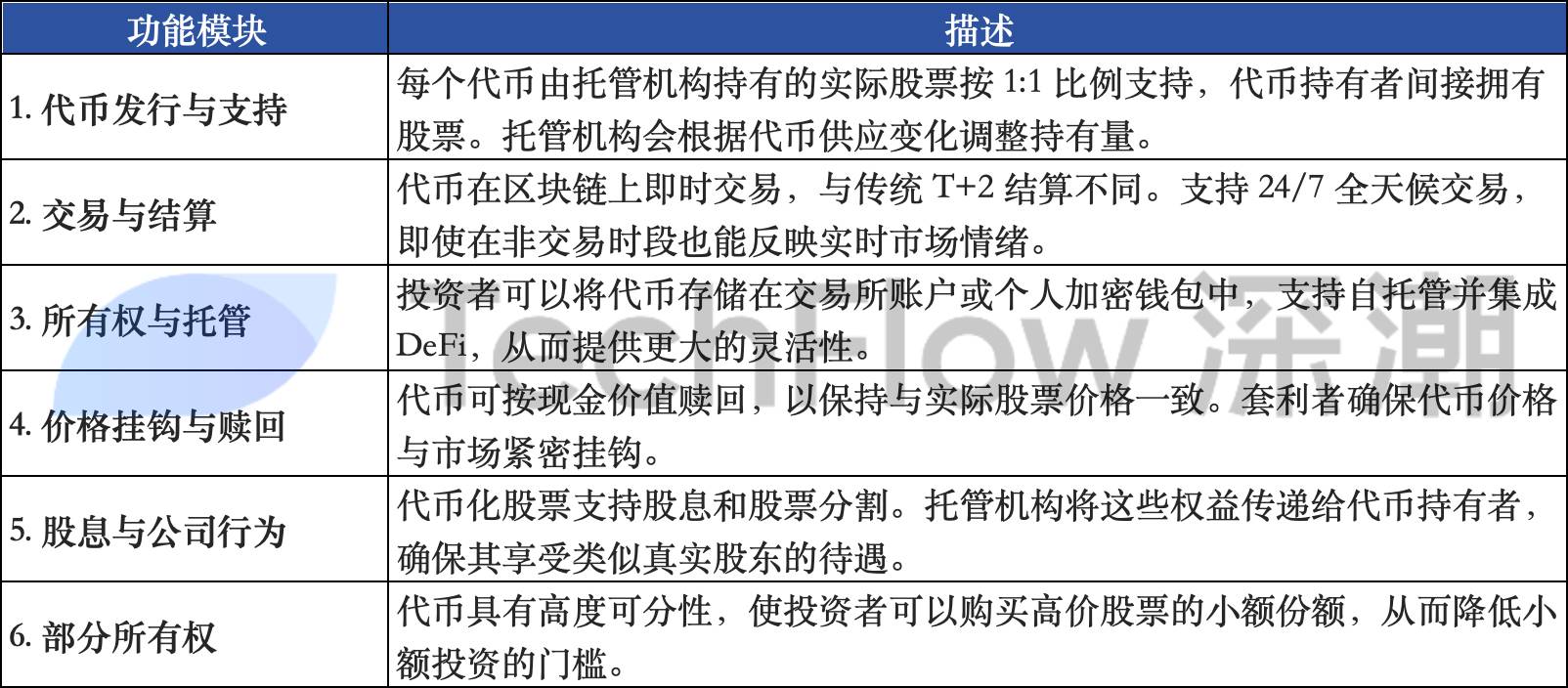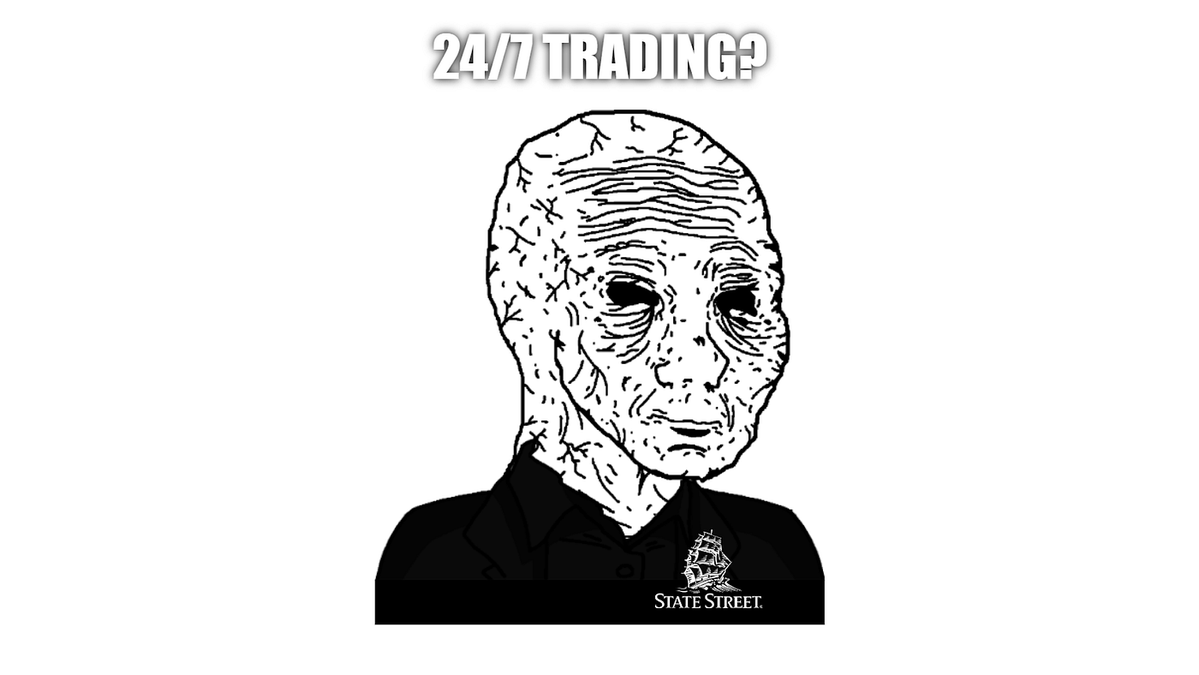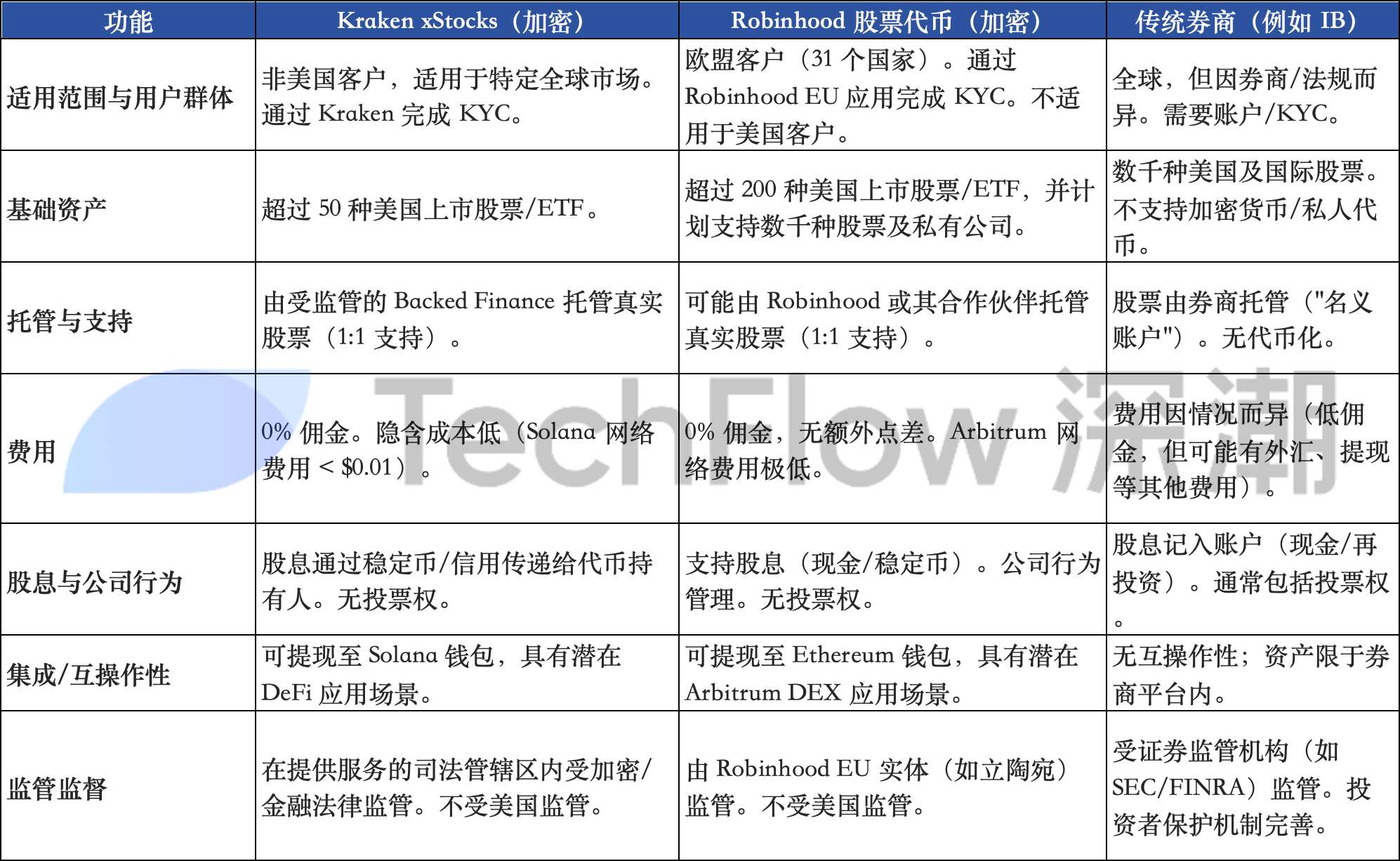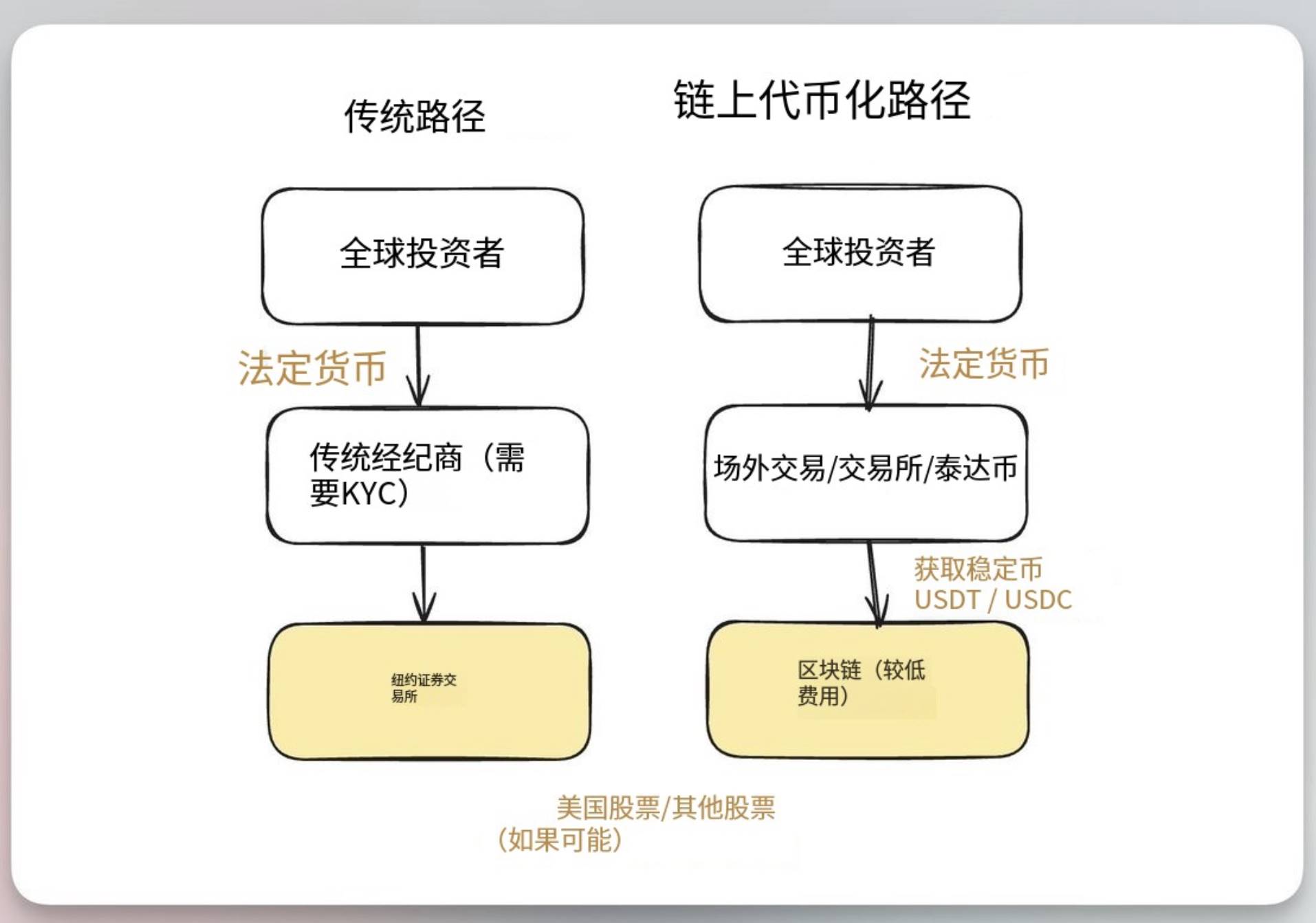In an optimistic scenario, tokenized stocks could become a "killer application" for the crypto industry, exponentially expanding the user base and bringing millions of real-world assets on-chain.
Author: Foxi
Translated by: Deep Tide TechFlow
Today, major trading platforms like Kraken and Robinhood have launched on-chain stock trading services, allowing investors to buy and sell tokens representing real stocks. This service enables investors to trade popular U.S. stocks (such as Apple, Tesla, Nvidia, etc.) 24/7, even outside normal market trading hours.
How does this mechanism incorporate KYC (Know Your Customer) considerations?
Are investors more inclined to trade stocks based on cryptocurrency rather than through traditional brokers?
Why do I believe this is a positive case?
Mechanism Analysis

Step-by-step breakdown (Translated by: Deep Tide TechFlow)
When you purchase a tokenized Apple stock through Kraken's xStocks, you are not buying a derivative or futures contract. Instead, Kraken's partner Backed Finance buys and holds a real Apple stock, storing it in a regulated custodian. Subsequently, a corresponding token is issued on the Solana blockchain as a digital representation of that stock.
On-chain stocks ≠ cryptocurrencies. On-chain stocks introduce some interesting arbitrage opportunities. During non-trading hours when the New York Stock Exchange (NYSE) is closed but blockchain trading is still open, token prices may slightly deviate from the last stock price due to market sentiment and trading activity. Arbitrageurs can profit from these price differences by buying and selling these tokens and redeeming them through the issuer, bringing the prices back into balance. However, investors need to be particularly cautious about the risks of purchasing on-chain stocks during non-trading hours.
It is important to emphasize that under this structure, token holders do not enjoy traditional shareholder rights (such as voting rights) — these rights are retained by the custodian. Investors are purchasing economic exposure to the stock's performance rather than actual shareholder status. This trade-off allows blockchain-based trading to occur while maintaining compliance.
24/7 Trading: The Biggest Highlight of On-Chain Stocks
The most obvious advantage of tokenized stocks is continuous trading. Unlike traditional exchanges that are open for about 6.5 hours on business days, blockchain-based tokens can be traded around the clock. Kraken's xStocks enables 24/7 trading, while Robinhood currently offers 24/5 trading and plans to expand to 24/7 trading after launching its exclusive Layer 2 based on Arbitrum.

This continuous availability creates unique market dynamics. When significant news breaks outside traditional trading hours — such as earnings reports, geopolitical events, or company-specific developments — your tokenized stocks can immediately reflect market sentiment. Token prices become real-time sentiment indicators, even providing price discovery during traditional market closures, which traditional markets cannot match.
Traditional vs. Tokenized

Overview, but I will elaborate more on KYC and custody below. (Translated by: Deep Tide TechFlow)
1. KYC
In fact, any compliant platform that offers stock exposure must adhere to KYC and related regulations — completely anonymous stock trading is nearly impossible within the legal framework. Nevertheless, there have been some decentralized attempts in the past to launch stock tokens without KYC, but most faced legal issues. For example, Terra's Mirror Protocol allowed users to mint and trade synthetic "mAssets" that mimicked U.S. stocks (like Tesla, Google, etc.) without KYC (only requiring a crypto wallet) from 2020 to 2022. However, the U.S. Securities and Exchange Commission (SEC) later determined that Mirror's stock tokens were unregistered securities and took legal action against Terraform Labs and its founder Do Kwon.

The entry path is different this time (Translated by: Deep Tide TechFlow)
This time is different, as even mainstream exchanges like Kraken and Bybit support trading stocks on their platforms. You can simply view these "stock coins" as "memecoins," except that a third party guarantees that each token is backed by actual stocks. I think Trump might like this model — providing retail investors with a more convenient way to enter the U.S. stock market through stablecoins. As long as the final settlement is done in USD, I believe regulatory pressure will not be too great.
2. Differences in Custody Models
The core of tokenized platforms prioritizes accessibility and flexibility. Both Kraken and Robinhood offer zero-commission trading for their stock tokens and generate revenue through spreads and other services. These platforms natively support fractional trading, 24/7 trading, and have the potential to integrate with decentralized finance (DeFi) protocols.
However, this model also comes with significant trade-offs. Traditional brokers provide regulatory protection, mature customer service, and direct shareholder rights, while tokenized platforms offer higher accessibility and innovative features but lack a clear regulatory framework and have relatively new operational infrastructure.
The fundamental differences in custody models are also worth noting. Traditional brokers hold stocks in the form of "Street Name" through central custodians, with your ownership recorded in their systems. In contrast, blockchain tokens issued by tokenized platforms can support self-custody, giving you direct control over your assets, but also requiring you to manage your private keys and security.
Why do I believe this is a positive case?
Capital Magnet Effect: Seamless Connection to Global Markets
On-chain stocks have structural advantages over traditional stock markets. For example, a retail investor in Nigeria can now easily purchase Apple stocks without facing complex international brokerage relationships or currency exchange fees. This is not just an enhancement of convenience but a fundamental expansion of market access, potentially bringing unprecedented capital inflows to crypto infrastructure.
This mechanism is far more complex than mere user acquisition. When someone purchases tokenized Tesla stocks, they are not only entering the crypto space but also creating sustained demand for stablecoins, generating transaction fees for Layer 2 networks, and validating the entire crypto ecosystem's status as a legitimate financial infrastructure.
Compounding Effect
Ethereum and its Layer 2s (such as Robinhood's future Arbitrum Layer 2) will benefit from the continuous trading volume of stock transactions, creating real economic value for ETH holders through fee burning and network effects. Meanwhile, Solana (supported by Kraken and Bybit) may capture market share in high-frequency stock trading due to its high throughput architecture, driving demand for SOL to pay transaction fees.
On-chain stocks may also address the "ghost town" problem in the crypto industry during bear markets. Historically, when cryptocurrency prices plummet, trading volumes quickly dry up, and users turn to traditional assets. However, with on-chain stocks, capital may be more inclined to stay within the crypto ecosystem, maintaining liquidity and platform participation even when altcoins perform poorly.
Tokenized stocks are not only an innovative attempt within the crypto ecosystem but also a bridge between traditional finance and blockchain technology. They provide global investors with lower barriers and higher flexibility for market access while injecting new vitality and economic value into the crypto industry.
Stealthy Adoption
Tokenized stocks may achieve a goal that the crypto space has struggled to reach for years: frictionless mass adoption. When Robinhood's European users trade stock tokens via Arbitrum, they are not intentionally choosing to enter the crypto space; they are simply enjoying superior financial services. This "stealthy adoption" model can attract millions of users who may never have actively chosen to purchase cryptocurrencies but are happy to use it once the crypto infrastructure is abstracted away.
Next Steps
From an investment logic perspective, the future of tokenized stocks largely depends on user adoption rates and the evolution of the regulatory environment. In an optimistic scenario, tokenized stocks could become a "killer application" for the crypto industry, exponentially expanding the user base and bringing millions of real-world assets on-chain. If a non-KYC model can meet the enormous demand for U.S. stocks, this trend will become even more apparent.
In the long run, the large-scale migration of stock trading (and even other asset trading) to blockchain rails will become a trend. This will not only enhance efficiency but also further lower barriers to entry and expand market participation.
Short-term Investment Opportunities: Bullish on the Following Areas
Stablecoins
Real World Assets (RWA)
Ethereum/Solana as Settlement Layers
U.S. Fintech Stocks: Companies like Robinhood ($HOOD), SoFi ($SOFI), and any investment opportunities related to Kraken (such as Kraken's planned IPO in 2026)
免责声明:本文章仅代表作者个人观点,不代表本平台的立场和观点。本文章仅供信息分享,不构成对任何人的任何投资建议。用户与作者之间的任何争议,与本平台无关。如网页中刊载的文章或图片涉及侵权,请提供相关的权利证明和身份证明发送邮件到support@aicoin.com,本平台相关工作人员将会进行核查。




